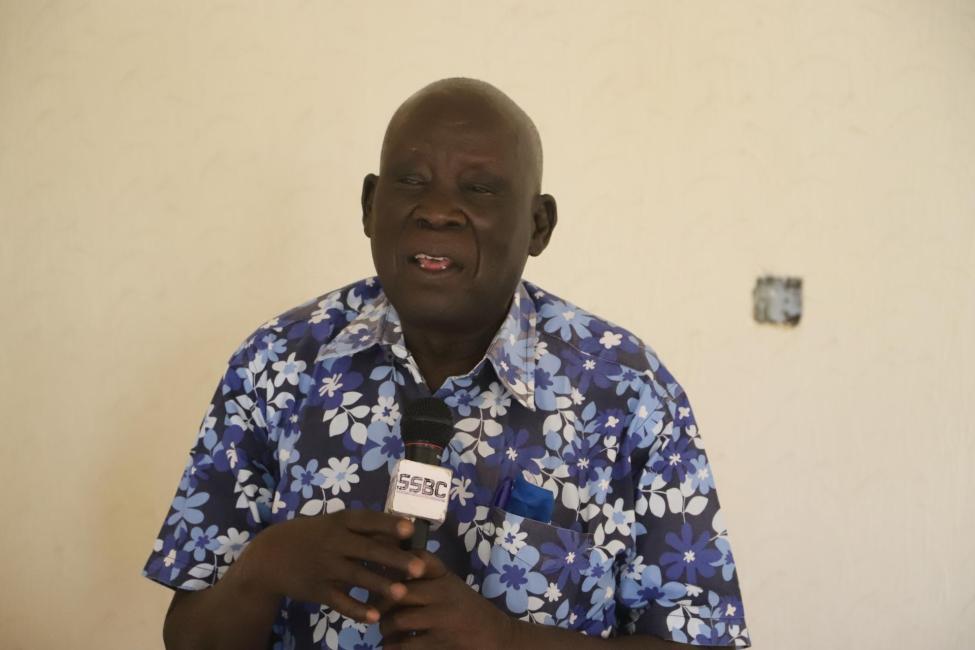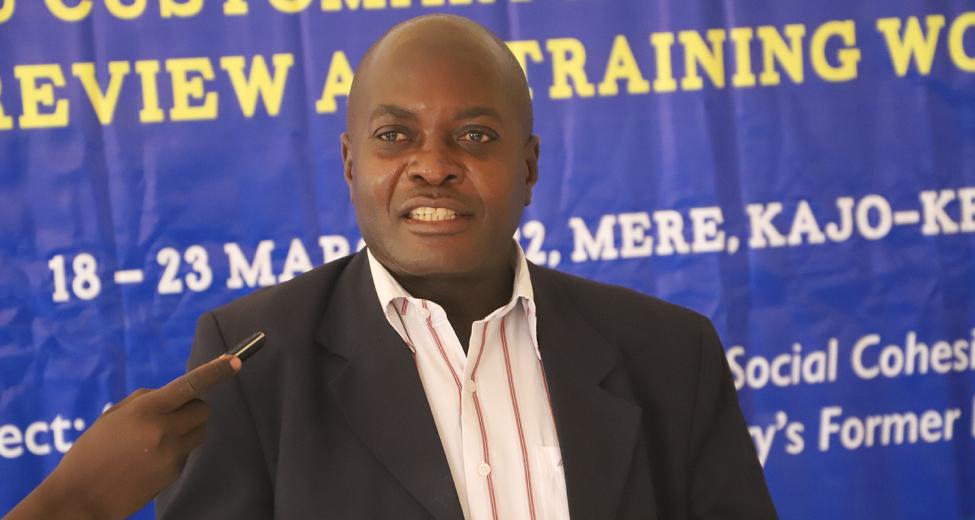-
Who We Are
WHO WE AREThe International Organization for Migration (IOM) is part of the United Nations System as the leading inter-governmental organization promoting since 1951 humane and orderly migration for the benefit of all, with 175 member states and a presence in over 100 countries. IOM has had a presence in South Sudan since 2011.
About
About
IOM Global
IOM Global
-
Our Work
Our WorkAs the leading inter-governmental organization promoting humane and orderly migration, IOM plays a key role to support the achievement of the 2030 Agenda through different areas of intervention that connect both humanitarian assistance and sustainable development. IOM South Sudan provides a comprehensive response to the humanitarian needs of migrants, internally displaced persons, returnees and host communities.
Cross-cutting (Global)
Cross-cutting (Global)
- Data and Resources
- Take Action
- 2030 Agenda
For five days, Barnaba Dumo sat and participated in group discussions in the Customary law ascertainment, review and documentation workshop facilitated by IOM with support from the United Nations Multi-Partner Trust Fund for Reconcilliation, Stabilization and Resilience (RSRTF) in Kajo Keji.
As an elder in the group, he provided the go-to person figurehead whenever group members needed guidance or historical perspectives and ideas.
The discussions centered around unwritten laws and traditional practices which govern the Kuku community of Central Equatoria State, in the southern part of South Sudan.
“We have been able to learn from each other. The young people have learned some of the things they did not know. We the elderly, have also learned what the young people are experiencing,” says Barnaba Dumo.
“I am happy, at least I’m sure these customary laws are reviewed from time to time. What I am grateful for is that this time we are going to have our customary law documented,” Dumo adds.
The Kuku society, built on stringent traditions and customs emphasizes social and moral values. However, the traditional justice system was disrupted when conflict erupted in 2016, displacing people from the region to neighboring Uganda as refugees while others fled to other parts of the country as internally displaced persons.
Through the project dubbed Locally-Driven Solutions for Addressing Social Cohesion and Promoting Early Recovery in the Country’s Former Breadbasket, IOM and a consortium of organizations including Finn Church Aid (FCA), Whitaker Peace and Development Initiative (WPDI), Community Empower for Progress Organization (CEPO) and Support for Peace and Education Development Program (SPEDP), organized the Kuku Customary AW Review Workshop in Kajo-Keji last month.
At the end of the one-week workshop, the participants that included a spectrum of the population of Kajo-Keji County, from young, women and elderly people, agreed to document their existing customary laws.
Among other things, the participants recommended the formation of the Customary Law Council in Kajo-Keji County to advise chiefs on the execution of traditional justice.
The State Minister of Local Government and Law Enforcement, Hon. Moro Isaac Jenesio commended the participants for their contribution to the historical process and emphasized the importance of preserving the cultural practices of the Kuku people.
“The brains that have our culture are fading away, so it is high time we captured this information and as we refine it might take time but at least we would have captured and put it in form of a document,” said Moro.
“These cultures are going to be reviewed with conformity to the statutory laws of the Republic of South Sudan.”
Speaking on the same occasion, Betty Poni Christopher—an area Member of Parliament said documentation of the Kuku customs and traditions will help in eliminating some “dangerous cultural practices.”
“I’m so glad because, since my growth up to this age, I didn’t know the origins of the customary laws we have been using. “We didn’t know where to start to review these laws to become good ones for the community,” said Poni.
“As we went through the topics, we realized there are other laws which were dangerous to the community. I thank IOM for this initiative to have these laws amended so that they can help our communities.”
The reviewed and documented customary laws of the Kuku people will be submitted to the County authorities and state legislative assembly to be enacted into law.
“As IOM, our role and function has been to facilitate this engagement for the good of the people of Kajo-Keji and to support all the programs which are currently ongoing with the increased return of people who had been displaced internally and those displaced across the borders,” says Geoffrey Okoth, Nexus advisor for Transition and Recovery at the International Organization for Migration (IOM).
“You have come with your resolutions and action points; it is you to roll it out and own it so that all the people in Kajo-Keji benefit from this,” he advised the participants.
The project dubbed Locally-Driven Solutions for Addressing Social Cohesion and Promoting Early Recovery in the Country’s Former Breadbasket is funded by the United Nations Multi-Partner Trust Fund to support reconciliation, stabilization and resilience in Yei, Lainya, Morobo, and Kajo Keji counties.
This story was written by Jale Richard, IOM Media and Communications Assistant.



